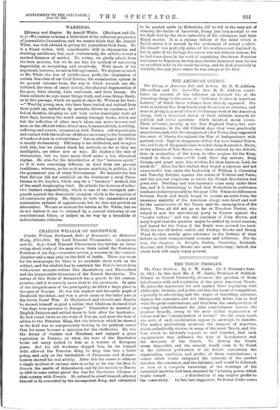CHARLES WILLIAM OF BRUNSWICK.
Charles William Ferdinand, Duke of Brunswick: an Historical Study, 1735-1806. By Lord Edmond Fitzmaurice. (Longmans and Co. 6s.)—Lord Edmond Fitzmaurice has written an inter- esting short study of the man whom Stein called the Suetonius Paulin= of his day,—cunetator nature, a waverer in the council- chamber and a man only on the field of battle. There was room for the monograph, for there is no available short work on the subject, and the student has to construct the Duke's career from voluminous memoir-writers like Hardenberg and Massenbach and the innumerable historians of the French Revolution. The nature of this Duke of Brunswick was a puzzle to his contem- poraries, and it is scarcely more clear to his successors. In spite of the insignificance of his principality, he filled a large place in the eyes of Europe. He was the nephew and favourite pupil of Frederick the Great, and won a great name in the latter part of the Seven Years' War. At Hastenbeck and Crevelt and Minden he showed himself so good a soldier that Chatham declared that "his days were precious to Europe." Thereafter he married an English Princess and settled down to look after his territories. He had sound views on the state of Europe, and gave the best of advice to the Prussian King, but the firmness which he showed in the field was so conspicuously lacking in his political career that his name became a synonym for the ineffective. He was the friend of Custine and Mirabean, and enjoyed a great reputation in France; so when the wars of the Revolution broke out many looked to him as a trustee of European peace. But his old weakness dogged him, he let himself drift, allowed the Prussian King to drag him into a futile policy, and only on the battlefields of Pirma.sees and Kaisers- lautern showed his real ability. After this his career is without a single incident of success, save in so far as he was the first to discern the merits of Scharnhorst, and by his mission to Russia in 1806 to-some extent paved the way for the future alliance of
that country with Prussia. He refused to assert himself, allowed I would compel a distribution of any surplus profits to himself to be overruled by the incompetent King, and submitted I the community." In this last suggestion Professor Jenks comes
to be pushed aside by Hohenlohe, till he fell in the very act of winning the battle of Anerstadt, living just long a-lough to see the fight lost by the sheer imbecility of his colleagues and their Royal master. It is a curious history of the mind which is flaccid unless it is nerved by the excitement of actual conflict. He himself was perfectly aware of his weakness and deplored it, but in spite of his failings his career was not without honour, for he had some share in the work of organising the future Prussian resistance to Napoleon, he won more battles than most men, he was an excellent ruler in his small territory, and he died gloriously in the field, the only place where he was always at his best.




















































 Previous page
Previous page